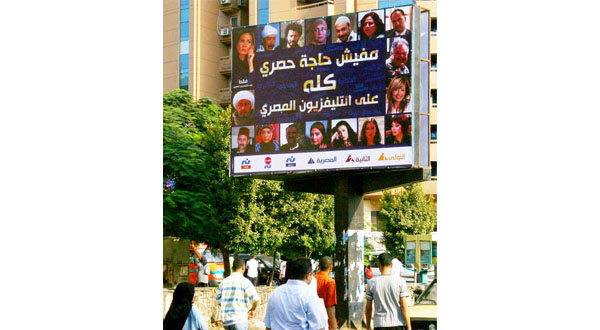 CAIRO: Advertising billboards perched on downtown Cairo’s buildings are being removed, as per a decision this week by Governor Abdel Azim Wazir, according to local reports.
CAIRO: Advertising billboards perched on downtown Cairo’s buildings are being removed, as per a decision this week by Governor Abdel Azim Wazir, according to local reports.
The aim is reportedly to preserve the aesthetic beauty of downtown Cairo’s rich architectural heritage. However, the decision has riled the anger of advertising agencies that depend on high-levels of exposure that come from these densely crowded areas.
The billboards are being removed in the areas of the intersection of Ramses Street and Tahrir Square, Abdel Moneim Riad Square, Al-Isaaf and Ramses Square, and all the way up to Abassiya Square, according to reports on news portal Egyptnews.net.
In response, advertising agencies threatened to switch off all billboards on the Mehwar and Moneeb roads, the Ring Road and the Sixth of October Bridge on Thursday.
After a meeting with executives, Ashraf Khairi, representative for advertising agencies, reportedly said that government-run news agencies of Al-Akhbar, Al-Ahram and Al-Gomhuria will participate in the strike.
Egynews.net reported that Khairi asked the Cairo governor to find an alternative solution, such as modifying the existing billboards to better complement the surrounding architecture, offering to work with the owners of said buildings in the modification process.
The licenses for the advertisements on the billboards are still valid, he noted, and companies have not violated the terms of agreement.
Hassan Abdel Monsef, head of outdoor advertising at Al-Ahram, one of the nation’s largest ad agencies, told Daily News Egypt the decision will have a deep negative impact on business.
Al-Ahram advertisements in the specified areas make up 40 percent of billboard revenue and 50 percent of uni-pole advertising revenue, he said. Uni-pole ads are billboards mounted on street poles, were also affected by the decision.
“Revenue from these areas is very high as there is very high visibility, and the area contains some of Cairo’s most established advertising areas,” he added, “We have a CocaCola ad in Tahrir that has become a landmark,” and has been there for 25 years.
“If we talk about the outdoor advertising industry and how it will be affected, I must point out that 60 percent of the profits of the industry go to different stakeholders,” he explained.
According to Abdel Monsef, there are the taxes and license fees paid to the government for the billboards of around 40 percent, constituting a big loss on government revenue from the ads.
“This decision also affects the owners of these buildings which sometimes have 30-40 inheritors who use the incomes from these advertisements to maintain the buildings’ interior and exterior,” he said.
He labeled the attempt of ad agencies to protest the decision by shutting down most of the billboards in Cairo on Thursday as “a passive civilized protest.”
“We hope that the governor goes back and looks into this, he [the Cairo Governor] has to know that we are on the side of the development, but there could have been plans made over the long term instead of making a very sudden move.
|We could have launched a campaign to make the ads look better working with the governorate or one of the ministries concerned,” Abdel Monsef said.
“Everywhere in cities around the world there are billboards: in Washington, New York, Tokyo…so I don’t understand why Cairo should be different,” Abdel Monsef concluded.
“I understand the governors’ part of view because the billboards are a form of visual pollution and the one’s downtown are not really aesthetically pleasing,” said Betty Khoury of the Wadi Environmental Science Center.
“Sometimes the billboards cover up windows or balconies concealing the beauty of the architecture and there are so many that it becomes a disservice to the public and to the brands, because with so many, it looks messy and you don’t see the individual advertisements anymore,” she added.
“However, I don’t think the solution is bringing them down, but setting guidelines about how the advertisements should be displayed like disallowing excessive lighting or blinding use of neon,” she suggested.
She also said that since ads have a limited duration, there should be regulations preventing agencies from leaving the empty frames of the billboards uncovered after the actual material of the ad has been removed.
More can be done to make beautify ads, particularly in roads through rural landscapers such as the Mehwar or Ring Road, where billboards are abundant and block views of agricultural land and the pyramids.
“In Lebanon, a bank repainted old buildings in Beirut, with landscapes and positive imagery, which has been really affective,” she said.



